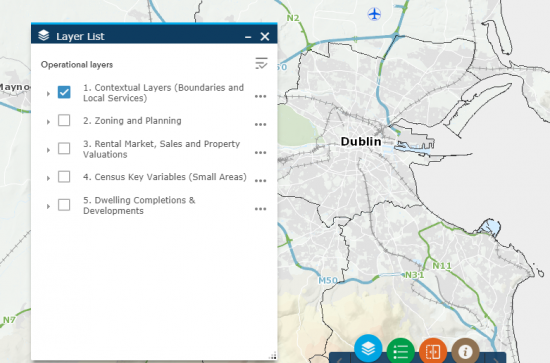
The Dublin Housing Observatory (DHO), a new business unit under Dublin City Council’s (DCC) Housing and Community Services Department, was launched today in a move to address the Dublin Housing Crisis. Lead by Dr Dáithí Downey, Head of Housing Policy Research and Development at DCC and Principal Investigator with the DHO, the unit will operate as an authoritative voice on housing issues. With a mission statement to help make Dublin an affordable and sustainable place to live, the Dublin Housing Observatory (DHO) will work to ensure that all Dublin city’s housing strategies, policies and practices are underpinned by robust evidence.
To offer objective and verifiable housing data, a new online Data Navigator tool has been developed in partnership with the All Ireland Research Observatory (AIRO) at Maynooth University Social Science Institute (MUSSI), Ordnance Survey Ireland (OSi) and Dublin City Council. With a public interface, the interactive mapping tool will allow people to source up-to-date and verified information on the housing market supplied from the Central Statistics Office, Private Rented Tenancies Board (PRTB), Property Register and local authorities. The online tool provides the public and policymakers with the most detailed information available on Dublin’s housing market, with a focus on the rental market, property sales and valuations, planning and zoning, along with key Census-based socio-economic variables.
Dr Dáithí Downey, Head of Housing Policy Research and Development with Dublin City Council, said, “Our new Data Navigator tool integrates and visualises publicly sourced data on housing for the first time. It will greatly improve the transparency of the housing market, allowing house-hunters to see registered RTB rents across Dublin, information on house sale prices and other concerns such as housing tenure patterns and the spatial distribution of the age, condition and type of Dublin’s housing stock. Building on this, we hope that future releases will help Dubliners choose where to live based on empirical data.”
Justin Gleeson, Director of AIRO at Maynooth University, said: “Good policy making needs to be driven by reliable and authoritative facts, and as Dublin faces increasing pressure on its housing supply, we will work closely with Dublin City Council to make sure the future of housing policy in the capital is informed by reliable data.”
Professor Ray O'Neill, Vice President for Research and Innovation, Maynooth University commented: “The role of the modern university is to engage with wider society as much as its own students, and it plays a vital role in the country’s long term sustainable development. The All-Ireland Research Observatory is just one of many Maynooth University initiatives that aims to do this by providing the hard data to inform robust policy-making. Its work with the Dublin Housing Observatory is going to be of great significance for the future of Dublin’s housing, and should inform similar schemes and strategies in urban centres across Ireland.”
Commenting on their involvement in the project, CEO of Ordnance Survey Ireland, Colin Bray said: “Ordnance Survey Ireland is delighted to be part of this initiative. The Mapping Viewer is powered by our GeoHive platform, which aims to provide easy access to quality spatial data. One of the opportunities that the Dublin Housing Observatory Mapping Viewer offers is the ability to make a level of data on housing in Dublin city available to the public that has never been seen before. Good data and accessible data is vital to creating good policy, that is why this is an absolutely essential tool to support housing policy design and implementation in the capital.”
The Data Navigator’s additional role will be in assisting registered users, primarily local authority housing, planning and development professionals as they work to provide high quality social and affordable homes in sustainable Dublin areas.
It can be viewed here.
